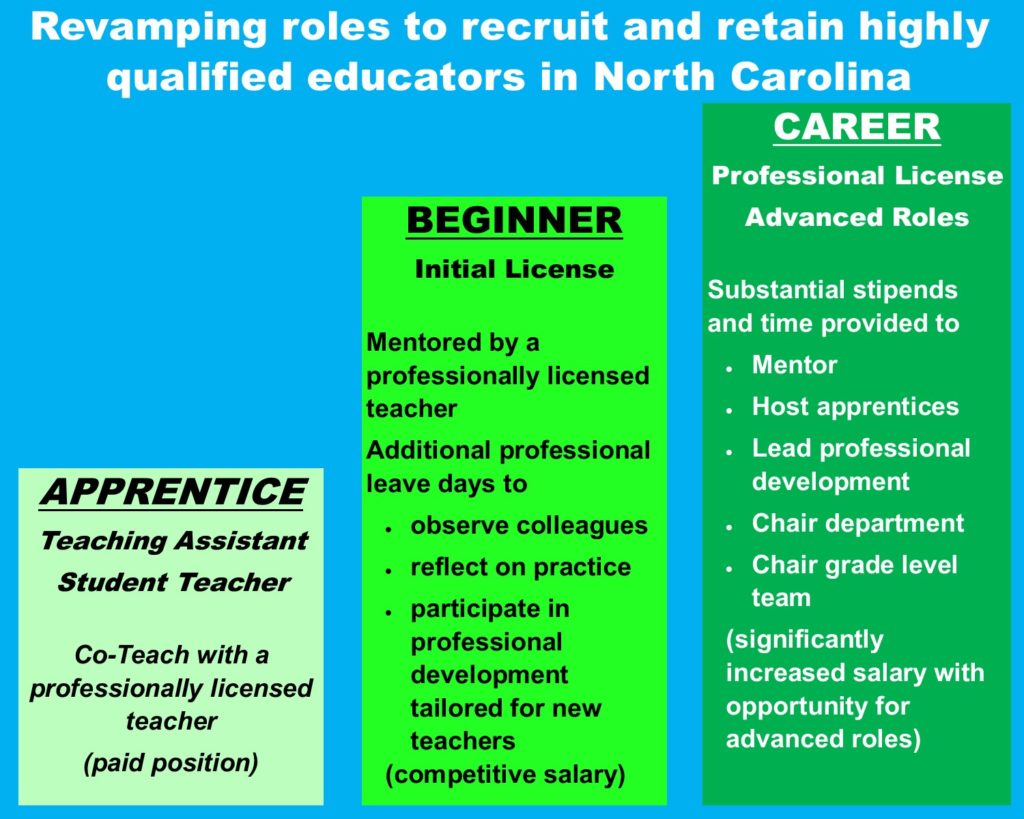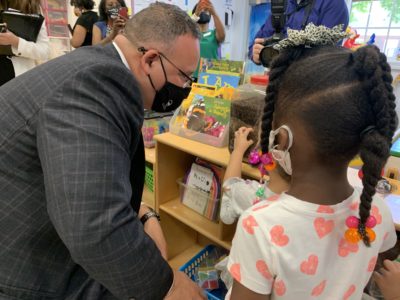

|
|
A teacher pipeline proposal making its way around the state claims to be the pathway to address the teacher shortage. As a parent of two elementary students and a veteran North Carolina teacher who has witnessed “teacher flight” for ten years, I’m concerned that this proposal will not result in the intended impact.
What most stands out to me as a current classroom teacher is that it institutionalizes the current triage model that is burning out the same highly-qualified, highly-effective educators we most want to keep as they’re called on to support classrooms lacking qualified classroom teachers. We must be mindful that recruitment without substantial efforts to retain results in a revolving door.
As a parent, my biggest concern with this plan is that it is akin to allowing someone to drive a school bus who understands how to use the brake pedal or gas pedal, not both. This plan prioritizes subject knowledge but is incomplete when a teacher must also understand kids, not just content.
The plan’s residency approach to teaching is promising, but a simpler and more effective pathway is possible that respects students’ rights to work directly with qualified classroom leaders.
It can be as easy as ABC: Apprentice, Beginner, Career.


Apprentice
A co-teacher model that offers a variety of teacher candidates wages would support the pipeline not only in North Carolina but nationwide. In our quest to make our mark in pathways to teacher candidacy, this is a worthy idea.
Merging the proposal’s first few pathways into a co-teacher experience not only brings in a variety of candidates but respects families’ rights that their child work directly with someone who has content and pedagogy qualifications as the co-teacher gains initial skills needed before leading their own classroom.
The co-teacher model is not a new one – we know them as teacher assistants. Nearly all current teacher assistants in North Carolina work with either grades K-3 or support K-12 special education programs. At a time when our state is particularly focused on literacy instruction among our youngest learners and teacher shortages in special education, we can and should do more to take advantage of these paraprofessional roles to transition into professional teacher licenses.
Extending the opportunity for teachers beyond grades K-3 to have a co-pilot in the classroom would help alleviate the impacts of class size caps that were removed for grades 4-12.
This is a win-win-win for the teacher candidate, students, and current teachers.
Beginner
Beginning teachers need strong support in the form of time and mentorship to promote retention. The current trend is to offer assistance in the form of scripted curriculum that squanders an opportunity for new teachers to bring their full selves into the classroom with creativity.
New teachers need opportunities to learn from and work with their peers in order to form bonds that will keep them in the classroom and create their identity as a teacher. They also need a competitive salary to bring them into our pipeline in the first place. Anything short of these perpetuates teacher turnover and continues the shortage.
Whereas the current proposal prioritizes off-ramps for those not meeting expectations, the larger challenge is keeping great teachers from taking off-ramps. This is true for both beginning and veteran teachers.
Career
The proposed plan states it, “Allows teachers to serve students at increased capacity” for “significantly increased salary.” Under the current triage model burning folks out, highly qualified teachers are serving more students beyond their assigned caseload as they take over classes with no teacher or support new or temporary folks in other classrooms.
In a few cases where stipends are offered, they don’t respect or reflect the additional responsibilities associated with these advanced roles. The plan holds promise to increase pay for those roles, but adequate pay is a misaligned love language in our state and needs further discussion.
The proposal is a good start for allowing great teachers to stay in the classroom while taking on advanced roles, but time within the current school day to support developing teachers and their students must be part of the package in addition to substantial pay. To motivate the best teachers into these roles, we cannot just add to their plates. We must make it palatable by carving out time during the school day for these tasks.
Next steps
Regardless of any plan selected, we face immediate staffing needs. Filling classrooms with qualified individuals must be a priority in both the short- and long-term. Lifting retiree limitations such as the six-month retirement waiting period and promoting job-sharing may also entice those who have left the profession to return.
Restoring over 7,000 teacher assistant roles cut statewide would support the pipeline by creating opportunities for more folks to dip their toe in the education profession while supporting the work of students and teachers. We can grow our own but need to reinvest in this existing co-teacher model as a pathway to full licensure.
It would be refreshing for our state to reinvest in creating the schools our students deserve by restoring the high-quality teacher pipeline that we need. Cutting corners preserves a leaky pipeline.
As a state boasting the most National Board Certified Teachers in the nation, we should do better to take advantage of our talented teachers in the best ways, instead of taking advantage in the worst ways.
The proposal has potential to maximize the talent of educators in a way that retains them and recruits others into the profession but is in need of revisions to ensure that its intent matches its impact. We should utilize in-house professional development led by peers sharing their best practices for fiscal prudence and strengthened connections.
There’s no shortage of suggestions current teachers in the pipeline can offer to address staffing needs. We’d love for folks to ask.
Most importantly to those who want to stay, we’d love for folks to listen.





